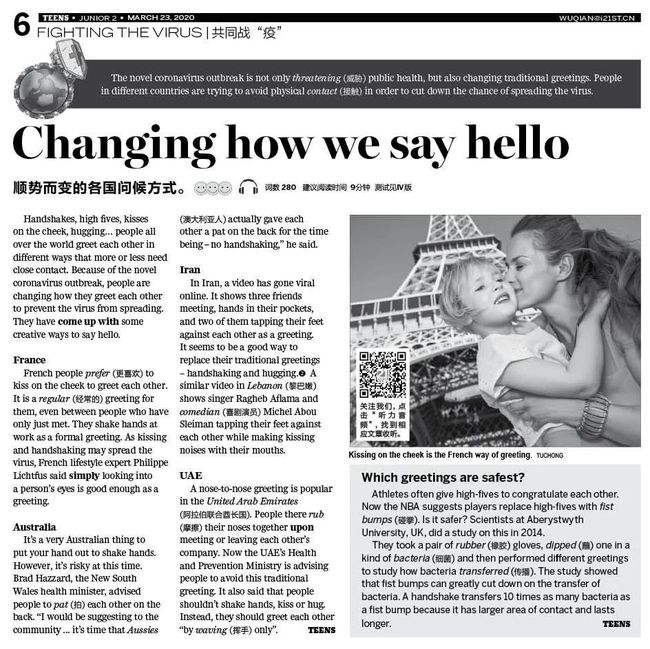顺势而变的各国问候方式 | TEENS共同战“疫”好文精选
在举国上下抗击疫情之际,21世纪英文报特别策划“共同战‘疫’”TEENS专题合刊,通过集中、及时、权威的内容,向广大青少年宣示党中央以人民为中心的执政理念,带领全国人民抗击疫情;开展科学教育,让青少年更好了解病毒和疫情相关的科普知识;展现共克时艰的凝聚力和人性光辉,引导青少年积极面对困难,理性看待问题,共同迎接春天的到来。
近期,21世纪英文报微信公众号将定期推送各年级共同战“疫”专题合刊中的精选文章,同时配有音频或视频、知识点解析、测试题、课件或课程等学习和教学资源,内容丰富、形式多样,“晚开学、不停学”~今天的精选文章“ Changing how we say hello 顺势而变的各国问候方式。” 来自《21世纪学生英文报·初二》第691期6版。

Changing how we say hello
顺势而变的各国问候方式。
Handshakes, high fives, kisses on the cheek, hugging… people all over the world greet each other in different ways that more or less need close contact. Because of the novel coronavirus outbreak, people are changing how they greet each other to prevent the virus from spreading. They have come up with some creative ways to say hello.
France
French people prefer (更喜欢) to kiss on the cheek to greet each other. It is a regular (经常的) greeting for them, even between people who have only just met. They shake hands at work as a formal greeting. As kissing and handshaking may spread the virus, French lifestyle expert Philippe Lichtfus said simply looking into a person’s eyes is good enough as a greeting.
Australia
It’s a very Australian thing to put your hand out to shake hands. However, it’s risky at this time. Brad Hazzard, the New South Wales health minister, advised people to pat (拍) each other on the back. “I would be suggesting to the community ... it’s time that Aussies (澳大利亚人) actually gave each other a pat on the back for the time being-no handshaking,” he said.
Iran
In Iran, a video has gone viral online. It shows three friends meeting, hands in their pockets, and two of them tapping their feet against each other as a greeting. It seems to be a good way to replace their traditional greetings – handshaking and hugging. A similar video in Lebanon (黎巴嫩) shows singer RaghebAflama and comedian (喜剧演员) Michel Abou Sleiman tapping their feet against each other while making kissing noises with their mouths.
UAE
A nose-to-nose greeting is popular in the United Arab Emirates (阿拉伯联合酋长国). People there rub (摩擦) their noses together upon meeting or leaving each other’s company. Now the UAE’s Health and Prevention Ministry is advising people to avoid this traditional greeting. It also said that people shouldn’t shake hands, kiss or hug. Instead, they should greet each other “by waving (挥手) only”.
Which greetings are safest?
Athletes often give high-fives to congratulate each other. Now the NBA suggests players replace high-fives with fist bumps (碰拳). Is it safer? Scientists at Aberystwyth University, UK, did a study on this in 2014.
They took a pair of rubber (橡胶) gloves, dipped (蘸) one in a kind of bacteria (细菌) and then performed different greetings to study how bacteria transferred (传播). The study showed that fist bumps can greatly cut down on the transfer of bacteria. A handshake transfers 10 times as many bacteria as a fist bump because it has larger area of contact and lasts longer.
本期报纸电子版请点这里

报纸配套课件
| 初二 |
本期报纸配套PPT课件请点这里 |
阅读测试题:
Fill in blanks:
| |
Daily greetings |
Greetings during the outbreak: avoid 1. _____ |
| France |
2. _____ on the cheek. Shake hands at work. |
Simply 3. _____ eachothers’ eyes. |
| Australia |
4. _____. |
Pat each other 5. _____. |
| Iran |
Shake hands. 6. _____. |
7. _____ against each other. |
| UAE |
Rub noses. |
8. _____ at each other. |
点击空白处查看答案
1. close contact 2. Kiss 3. look into 4. Shake hands 5. on the back 6. Hug 7. Tap feet 8. Wave









